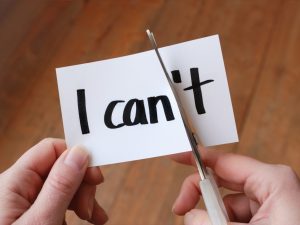Self-knowledge: the first and most essential step to develop our self-esteem is self-knowledge. Self-knowledge, or self-awareness, means knowing yourself. It is about knowing how each one of us is, knowing ourselves deeply. Know our strengths and weaknesses, our strengths and our weaknesses.
Self-acceptance: as a second step, it is essential to accept ourselves as we are. It is imperative to accept yourself unconditionally.
Empower ourselves: on the other hand, it is vital to be aware of our potential. Once we have met and accepted each other, we will be aware of our strengths. We must empower and develop them to get the most out of ourselves.
Minimize weak points: it is essential to work on our weak points. We must work them without becoming obfuscated. We know that they are our "Achilles heel," and for that reason, we will work them with more calm and delicacy. But we will never put them away and forget about them.
Conduct ourselves positively: and finally, it is vital to conduct ourselves positively. That is, positively considering ourselves, in which we treat each other with respect and value ourselves positively. It is essential to love and appreciate ourselves.Until you value yourself, you will not value your time. Until you value your time, you will do nothing with it (M. Scott Peck)
The first step to do something in this life is to value ourselves because when we have low self-esteem, we become immobilized.
- A person cannot be comfortable without his approval (Mark Twain)
It is impossible for a person to be happy if he does not value himself positively and does not love himself enough. You need to love yourself to be happy.
- Never be bullied silently. Never let it become a victim to you. Don’t accept anyone’s definition of your life; define yourself (Harvey Fierstein)
Mistreating yourself is the worst thing we can do. Nor is it a good thing to let others guide us and decide what we have to do in this life. Personal development begins with defining yourself and fighting for what you want.
- Love yourself first, and everything else falls into order. You have to love yourself to do anything in this world (Lucille Ball)
Loving yourself is the first step in doing anything in life. If we do not love ourselves, no one will respect us, and we will be in continuous suffering.
- Self-care is not a selfish act; it is simply the proper management of the only gift I have, the gift for which I am in the world to offer to others (Parker Palmer)
Treating yourself well does not mean that we are selfish people; it is necessary for personal well-being. So, to not suffer more than on account, you have to take time for yourself and treat yourself with love.
- When you adopt the point of view that any criticism you make is a self-criticism, that any judgment you make is a self-judgment, you wisely develop in yourself an unconditional love that will be the light of the world (Harry Palmer)
This phrase comes to say that we should not waste time criticizing others and judging them. You have to spend that time on yourself, improving every day.
- Why should we care about what others think of us? Do we have more confidence in their opinions than in ours? (Brigham Young)
Constantly thinking about what others think of us is not good from the emotional balance point of view. As has already been saying, happiness is in oneself.
If you want to stop thinking about what others think of you, we leave you some tips in this article: "Tips to stop thinking about what others think of you."- To establish true self-esteem, we must focus on our successes and forget about failures and adverse events in our lives (Denis Waitley)
Our successes or, rather, our perception of our successes will be critical in developing our self-esteem. Taking iron out of our failures and seeing them as opportunities to learn is the best way to develop self-esteem.
What is self-concept?
Self-concept is the set of elements that a person uses to describe himself.
This is formed by our image of ourselves and the information we receive from others about our person; it is a set of representations and judgments referring to oneself in different aspects: bodily, psychic, behavioral, and social (Rojas, 2017). Self-concept leads to self-knowledge; This presupposes knowing our capacities and limitations; we can get to know ourselves almost wholly, although new unknown facets will always emerge.
“If you love yourself, you love everyone else as yourself.” (Eckhart)
What is self-image?
Self-image can be a consequence and also the cause of many psychological disorders.
Self-image goes beyond physical appearance, as it includes both what you feel and thinks about yourself and the attitudes and things you do. This is formed throughout life and depends mainly on the relationships you have had since childhood with the important people who have been in your life, thus forming your impressions and attitudes towards you and doing what is around you.
a) Importance of self-esteem
Self-esteem is a vital human need. It is basic and makes an essential contribution to the process of life, playing a vital role in the choices and decisions that shape it. Self-esteem is essential for normal and healthy development, and it has survival value. It represents an individual achievement, the product of a persevering work of internal knowledge.
A time has come when self-esteem is no longer only a significant psychological need, but it has also become an economic need of the same importance, an attribute to adapt to an increasingly complex, competitive, and crowded world of challenges. A human being cannot hope to fulfill his full potential without healthy self-esteem.
b) Theoretical bases
William James
The first attempt to define self-esteem is found in Principles of Psychology (1980) by the father of American psychology, William James. Self-esteem gained strength in the eighties with the publication of this book, and scientific studies began to appear: numerous psycho-pedagogical investigations on self-esteem highlight its decisive importance for the full development of the dynamic potential of the person; having positive self-esteem is the fundamental requirement for a fulfilling life.
Each person has an essentially biological-based inner nature that is natural, intrinsic, innate, and immutable. It is advisable to bring this inner nature to light.
Abraham Maslow
For Maslow, promoter of humanistic psychology, self-esteem is a theory about self-realization. Stating that each possesses an inner nature, Maslow mentions human needs (life, immunity, security, belonging, affection, respect, self-esteem, and self-realization).






























Add Comment